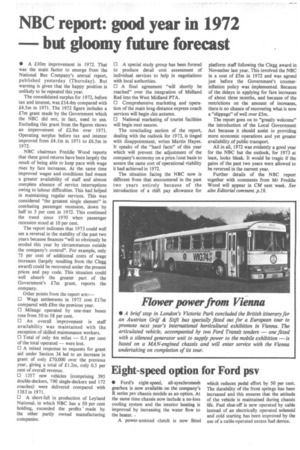NBC report: good year in 1972 but gloomy future forecast
Page 31

If you've noticed an error in this article please click here to report it so we can fix it.
O A £10m improvement in 1972. That was the main factor to emerge from the National Bus Company's annual report, published yesterday (Thursday). But warning is given that the happy position is unlikely to be repeated this year.
The consolidated surplus for 1972, before tax and interest, was £14.4m compared with £4.5m in 1971. The 1972 figure includes a £7m grant made by the Government which the NBC did not, in fact, need to use. Excluding this grant from the figures shows an improvement of £2.9m over 1971. Operating surplus before tax and interest improved from £4.1m in 1971 to £6.5m in 1972.
NBC chairman Freddie Wood reports that these good returns have been largely the result of being able to keep pace with wage rises by fare increases. At the same time improved wages and conditions had meant a greater availability of staff and almost complete absence of service interruptions owing to labour difficulties. This had helped in maintaining regular services. This was considered "the greatest single element" in combating passenger recession, down by half to 3 per cent in 1972. This continued the trend since 1970 when passenger recession stood at 10 per cent.
The report indicates that 1973 could well see a reversal in the stability of the past two years because finances "will so obviously be eroded this year by circumstances outside the company's control". For example, only 75 per cent of additional costs of wage increases (largely resulting from the Clegg award) could be recovered under the present prices and pay code. This situation could well absorb the greater part of the Government's £7m grant, reports the company.
Other points from the report are: O Wage settlements in 1972 cost £17m compared with £8m the previous year. CI Mileage operated by one-man buses rose from 50 to 58 per cent.
O An overall improvement in staff availability was maintained with the exception of skilled maintenance workers.
O Total of only 4m miles — 0.5 per cent of the total operated — were lost.
O A mixed response to requests for grant aid under Section 34 led to an increase in grant of only £70,000 over the previous year, giving a total of £1.2m, only 0.5 per cent of overall revenue.
O 1357 new vehicles (comprising 395 double-deckers, 790 single-deckers and 172 coaches) were delivered compared with 1383 in 1971.
O A short-fall in production of Leyland National, in which NBC has a 50 per cent holding, exceeded the profits' made by the other partly owned manufacturing companies. O A special study group has been formed to produce detail cost assessment of individual services to help in negotiations with local authorities.
O A final agreement "will shortly be reached" over the integration of Midland Red into the West Midland PTA.
O Comprehensive marketing and operation of the main long-distance express coach services will begin this autumn.
O National marketing of tourist facilities will begin next season.
The concluding section of the report, dealing with the outlook for 1973, is tinged with disappointment, writes Martin Hayes. It speaks of the "hard facts" of this year which will prevent the adjustment of the company's economy on a price /cost basis to assure the same sort of operational viability it had achieved in 1972.
The situation facing the NBC now is different from that encountered in the past two years entirely because of the introduction of a shift pay allowance for
platform staff following the Clegg award in November last year. This involved the NBC in a cost of Lim in 1972 and was agreed just before the Government's counterinflation policy was implemented. Because of the delays in applying for fare increases of about three months, and because of the restrictions on the amount of increases, there is no chance of recovering what is now a "slippage" of well over £5m.
The report goes on to "greatly welcome" the introduction of the Local Government Act because it should assist in providing more economic operations and yet greater availability .of public transport.
All in all, 1972 was evidently a good year for the NBC but the outlook, for 1973 at least, looks bleak. It would be tragic if the gains of the past two years were allowed to be reversed in the current year.
Further details of the NBC report together with comments from Mr Freddie Wood will appear in CM next week. See also Editorial comment. p.19.




















































































































